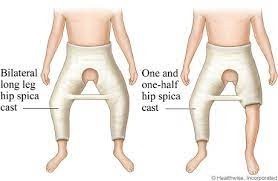The nurse is caring for an infant with a hip spica cast who has just returned from surgery. Which nursing action will be priority for this patient?
Palpating a brachial pulse.
Assessing bilateral radial pulses.
Auscultating the heart rate apically.
Checking capillary refill in the toes.
The Correct Answer is D
Hip spica casts are typically used to immobilize the hip joint and are often used in the management of hip dysplasia or after surgery. These casts can cause restricted mobility and limit blood flow to the legs and feet, which can lead to complications such as swelling, decreased circulation, or pressure sores.
Checking capillary refill in the toes is a critical nursing intervention to assess for the presence of adequate circulation and blood flow to the affected limb. If capillary refill is slow or absent, it may indicate compromised circulation and require immediate intervention to prevent further complications.
Palpating a brachial pulse, assessing bilateral radial pulses, or auscultating the heart rate apically are not the priority nursing actions for an infant with a hip spica cast. While monitoring vital signs and circulation are important components of nursing care, the priority at this stage is to assess and manage the immediate postoperative needs of the patient, including monitoring for potential complications related to the hip spica cast.

Nursing Test Bank
Naxlex Comprehensive Predictor Exams
Related Questions
Correct Answer is A
Explanation
The patient's vital signs indicate signs of septic shock, including low blood pressure (70/46 mm Hg), tachycardia (136 beats/min), and tachypnea (32 breaths/min). The patient also has a high temperature of 104°F, indicating a fever. These findings suggest a systemic response to an infection that is leading to inadequate tissue perfusion.The initial treatment for septic shock includes fluid resuscitation to improve blood pressure and tissue perfusion. A fluid bolus of 0.9% Sodium Chloride (normal saline) is commonly used to restore intravascular volume in septic shock. It helps to increase blood pressure, improve organ perfusion, and stabilize the patient's condition.
The other interventions, such as administering Pantoprazole (Protonix) for gastrointestinal protection, giving Acetaminophen (Tylenol) for fever control, or administering rapid-acting insulin per sliding scale for hyperglycemia, are important aspects of care but should be implemented after the initial fluid resuscitation. The priority at this moment is to address the patient's hypotension and inadequate tissue perfusion through the administration of fluid bolus.
Correct Answer is A
Explanation
In a client with minimal change nephrotic syndrome (MCNS), the primary concern is the management of fluid volume and hydration status. MCNS is characterized by increased glomerular permeability, leading to excessive protein loss in the urine and subsequent hypoalbuminemia. This can result in fluid retention and edema formation, including facial edema.
Hypertension is a common complication in clients with MCNS, and it further contributes to fluid retention and potential complications. Therefore, closely monitoring the client's fluid volume and hydration status, including daily weights, intake and output measurements, and assessment of edema, is crucial to detect any changes and guide appropriate interventions.
While other actions, such as consulting with a registered dietitian about adequate intake or using sterile technique to prevent infections, may be important aspects of the client's care, they are not the priority in this situation. The immediate concern is managing the client's hypertension and fluid volume status to prevent complications associated with MCNS.
Whether you are a student looking to ace your exams or a practicing nurse seeking to enhance your expertise , our nursing education contents will empower you with the confidence and competence to make a difference in the lives of patients and become a respected leader in the healthcare field.
Visit Naxlex, invest in your future and unlock endless possibilities with our unparalleled nursing education contents today
Report Wrong Answer on the Current Question
Do you disagree with the answer? If yes, what is your expected answer? Explain.
Kindly be descriptive with the issue you are facing.
